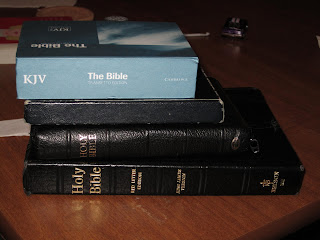
Why do bad things happen to good people? That's one of the most basic questions that people have when it comes to faith. They ask themselves 'if God is great and good and all-powerful and magnificent, why do bad things happen to good people?' It's a fair question, when we stare down the injustices done to people by a cruel and indifferent universe. We want to know why tsunamis hit people, why earthquakes hit islands, and why good and nice and well-meaning people end up getting used and abused by their fellow man. That all happens. And we say how terribly unfair it is that these people are chewed up by the world.
Well, yes. I suppose. And this was a topic in the latest book by Richard Dawkins, who has written it for younger readers. There's a chapter called 'why do bad things happen?' In this chapter, he makes the case that a great many things that happen, bad or good, just because they do. The universe is indifferent to us, and doesn't care much if we live or die. We are not rewarded for being virtuous, nor are we punished for being bad. Things just happen, bad or good. And that's fine, I suppose, but it misses a couple of key points.
First of all, the entire notion of bad and good works us into a bit of a moral corner. We are capable of seeing things as overall bad and good by means of whatever moral compass we have, Christian or otherwise. We have an idea about what might be called good or bad, but these aren't scientific answers. When Dawkins gets close to it, he mentions that lions are bad for antelope, but antelope are also, should they be swift, are bad for lions. So what is good and what is bad? What is good for us is bad for something else, and what is bad for us is good for something else! So what is overall good, and what is overall bad? What we understand as good and bad is usually something couched not in terms of science and biology, but in terms of morality. Virtue, justice, sacrifice, love, truth, charity, all these things are good, but won't come up much in nature at all.
Of course, this gets us to the point where we can understand that diseases and parasites can get us, and if we kill them, it's bad for them, and if they kill us, it's bad for us. Okay. But Dawkins never gets to the biggest point of all: why do bad things happen? Not just because the universe is cold and indifferent, not just because nature is red in tooth and claw, but also because we are bad to each other. Actively and directly. We are incredibly capable of hurting each other, of being cruel, being vicious, or, more often, not caring who or what we crush on the way. Yes, the biggest problem we have in our world is that we human beings, people who know, unlike the cold universe what is good and bad, so rarely choose the good, and so frequently choose the bad. And this is much greater in the face of the disasters mentioned above. We are used to people being callous and cruel to each other on a daily basis in small things. They cut us off in traffic, they drive past us on the shoulder, we see them cutting in front of us in line, and so on. And we know that we do these things, or things like them on a regular basis. Do we care much about the people we cut off? Are we very interested about the people whom we wrong? Do we care about the makers or producers of the movies and music that we download for free?

Manny Perry would like you to pay to see movies.
If we are so careless with those whom we hurt, and those who are hit by natural disasters, why should we be surprised when others do this to us, and those we care about? The big question is not 'why are bad things happening to good people,' but 'why am I, a good enough person I suppose, not caring more about the bad junk I do to others, whether they're good or bad? Why don't I care?'
Romans 7:18-20 says "For I know that nothing good dwells in me, that is, in my flesh. For I have the desire to do what is right, but not the ability to carry it out. For I do not the good I want, but the evil I do not want is what I keep on doing. Now if I do what I do not want, it is no longer I who do it, but sin that dwells within me." ESV
If this is how St. Paul saw himself, as someone who wanted to do the right thing but could not quite carry it out, and he was a
saint, then you can see how we, those of us who are regular people, might contribute somewhat to that. We are not so good. We are the reason that people do bad things to each other, and why natural disasters get worse, through our handling of them.
But is there no hope? Well, not quite. Romans carries on in chapter 12:1-2
"I appeal to you, brothers, by the mercies of God, to present your bodies as a living sacrifice, holy and acceptable to God, which is your spiritual worship. Do not be conformed to this world, but be transformed by the renewal of your mind, that by testing you may discern what is the will of God, what is good and acceptable and perfect." ESV.
So, there is a measurement of good and bad. And so we are called by God to do what is good. And what is good? We find it in Romans 12:9-21. If you want bad things to stop happening to good people, stick to this.
"Marks of the True Christian
9Let love be genuine. Abhor what is evil; hold fast to what is good. 10Love one another with brotherly affection. Outdo one another in showing honor. 11Do not be slothful in zeal, be fervent in spirit,g serve the Lord. 12Rejoice in hope, be patient in tribulation, be constant in prayer. 13Contribute to the needs of the saints and seek to show hospitality.
14Bless those who persecute you; bless and do not curse them. 15Rejoice with those who rejoice, weep with those who weep. 16Live in harmony with one another. Do not be haughty, but associate with the lowly.h Never be wise in your own sight. 17Repay no one evil for evil, but give thought to do what is honorable in the sight of all. 18If possible, so far as it depends on you, live peaceably with all. 19Beloved, never avenge yourselves, but leave iti to the wrath of God, for it is written, “Vengeance is mine, I will repay, says the Lord.” 20To the contrary, “if your enemy is hungry, feed him; if he is thirsty, give him something to drink; for by so doing you will heap burning coals on his head.” 21Do not be overcome by evil, but overcome evil with good." ESV
It's a good way to be. It's good directives to be good in this way. Will you fail at keeping this? Yes you will. But that's why we are forgiven. And seeing ourselves as people who are and need to be forgiven, curiously enough keeps us humble, and more capable of doing what God would have us do. Not to earn his salvation, but because it has been given already.

 Yes, on the left, that's Richard Dawkins, celebrated anti-theist. And there he is, wearing an "Atheists for Jesus" t-shirt. Even he who loathes religion can still recognize that the teachings of Jesus, at least on moral issues are good, and worth following. You see, what Jesus did was to break so far out of the circular reasoning that we're all accused of, and to present his teachings on the poor, the weak, the meek, the oppressed, the rich, in such a way as we could test them and find them to be true. It's not "Jesus is right because he says he's right," it's "Jesus is right because he's reminding me of what I have known to be the truth, deep down, all along."
Yes, on the left, that's Richard Dawkins, celebrated anti-theist. And there he is, wearing an "Atheists for Jesus" t-shirt. Even he who loathes religion can still recognize that the teachings of Jesus, at least on moral issues are good, and worth following. You see, what Jesus did was to break so far out of the circular reasoning that we're all accused of, and to present his teachings on the poor, the weak, the meek, the oppressed, the rich, in such a way as we could test them and find them to be true. It's not "Jesus is right because he says he's right," it's "Jesus is right because he's reminding me of what I have known to be the truth, deep down, all along."






